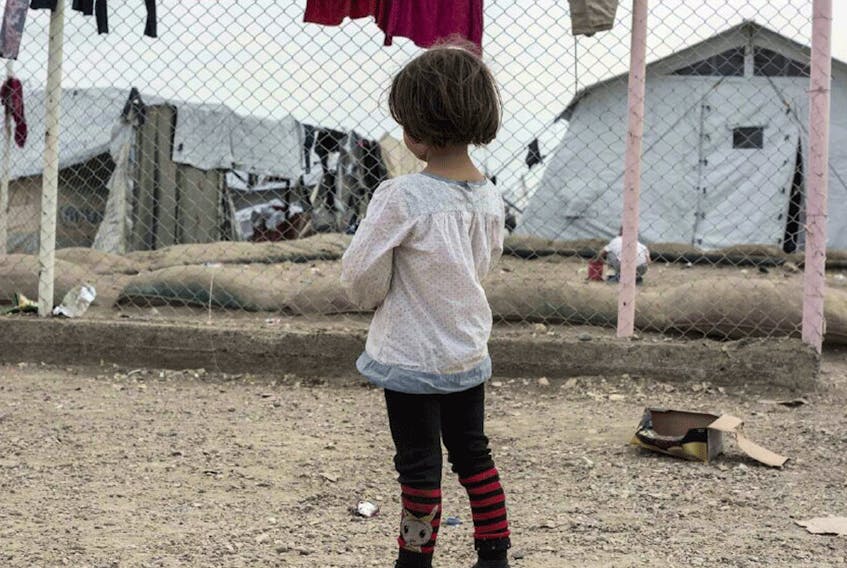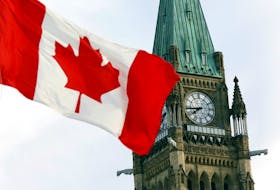A five-year-old Canadian orphan who was stuck in a refugee camp in Syria is finally on her way to Canada to join her uncle, a sudden deviation from Ottawa on repatriating Canadian families languishing in camps for suspected ISIL supporters.
As celebration for the girl known as Amira rang out from family and human rights groups, so too did an urgent question: What about the other 25 Canadian children stuck in Syrian camps — those with politically less palatable prospects because they still have their parents with a suspected ISIL past.
Early last year, when she was four, Amira was found walking alone on a road in war-torn northeastern Syria. Her parents and her siblings were killed, likely in an airstrike during the fight against the Islamic State, also known as ISIL or ISIS.
Although born in Syria, Amira is a Canadian citizen because both of her parents were Canadians. Her mother and father probably moved to the area to join ISIL in Iraq and Syria, making her case politically delicate despite an obvious humanitarian imperative.
Amira was taken to the Al-Hawl Camp, run by the Kurdish forces, where captured ISIL fighters and their families are held.
Since then, her extended family in Canada, along with human rights organizations, has worked to have her repatriated to Canada while the government seemed unwilling to act.
In July, the family asked the Federal Court to intervene.
A government official was on the verge of being cross examined in that lawsuit when a phone call Sunday shared the news, said Lawrence Greenspon, her family’s lawyer in Ottawa.
He was told Amira had been taken out of the Al-Hawl Camp, was with a Canadian consular official and on her way back to Canada.
“It’s an absolutely wonderful day for Amira and for her family,” Greenspon said. “The uncle and the family are just overjoyed and they can’t wait to hug their little girl.”
Amira’s uncle, an engineer in Toronto, expressed his joy in a written statement.
“We are delighted by this news and would like to express our gratitude to everyone who has made this possible. We would kindly request privacy as my niece transitions into her new life in Canada.”
To protect her identity, in court proceedings she is named only as Amira and the uncle identified only as Ibrahim.
Francois-Philippe Champagne, Canada’s Minister of Foreign Affairs, confirmed Amira’s repatriation.
“I am pleased that this Canadian child orphaned in Syria will soon be united with extended family in Canada,” Champagne said in a statement.
“Global Affairs Canada has been actively engaged in this case since first learning of the child’s exceptional circumstances. The focus is now on protecting the child’s privacy and ensuring that the child receives the support and care needed to begin a new life here in Canada.”
She is going to be welcomed into a completely new life in a new place
Champagne said the repatriation was assisted by Canada’s military but did not specify how. Inquiries to the Department of Defence were referred to Global Affairs Canada, which said it would not answer the question “for security reasons.”
She was expected to arrive in Canada Monday.
Prime Minister Justin Trudeau was asked, Monday, whether Amira’s repatriation signalled a change in the government’s handling of Canadians who remain incarcerated in Syrian camps.
“I think we have to recognize that this particular situation was an exceptional case of an orphan who no longer had any close family,” Trudeau said.
“That was why we have worked very hard over the past months to bring her to Canada. Obviously, however, this is a situation where we’re trying to say as little as possible about it, to respect her, and her family’s privacy as they adjust to being back in Canada.”
Farida Deif, Canada Director for Human Rights Watch (HRW), is among those pushing for the repatriation of Amira — and other Canadians stuck in the Syrian camp.
She believes the pressure for this case became too much for the government to withstand.
Amira was featured in a HRW report in June and was the focus of public calls from United Nations officials, academics and several international human rights organizations, all highlighting Canada’s failure to act.
“The lawsuit, in a way, was the straw that broke the camel’s back,” she said.
“She saw her entire family killed before her very eyes, she was left with a caregiver in a squalid camp in northeast Syria,” Deif said. “Slowly more and more pressure built up and more and more shame put upon Canada for its ridiculous position and for being completely paralyzed.”
There are another 46 Canadians detained in northeast Syria, 25 of them children of suspected ISIL supporters or fighters, incarcerated as the militant organization’s offensive collapsed. While other countries have been repatriating their citizens, Amira is the first case closed by Canada.
“Those other children are ones who have a surviving parent and the government does not seem to have the political will to return any of the adults. Because it doesn’t want to return the adults, it also punishes the children. They pay the price,” Deif said.
“Their government continues to abandon them there. This is a welcome step, but it is a first step,” she said of Amira.
Both Deif and Greenspon said Canadians have a right to return to Canada and any who face allegations of ISIL involvement should be prosecuted in Canada.
Greenspon hopes Amira’s adjustment and recovery will be swift and successful.
“The child study experts all tell us that if you can get to a child who has been through trauma before the age of six your chances of improving their life and turning their life around are much, much better than any time after that.
“She’s five years old now and she is going to be welcomed into a completely new life in a new place.”
• Email: [email protected] | Twitter: AD_Humphreys
Copyright Postmedia Network Inc., 2020









